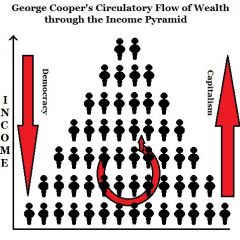Each national economy is driven forward by an aspirational minority, but not everyone aspires to a “higher economic life.”
Aspiration drives economic growth
The hope that hard work will be exceptionally rewarded is a major driver in capitalism. It results in innovative products being introduced to the market and costs being reduced for existing products and services.
The higher income achieved by the aspirational urge results in more money being spent on all sorts of goods and services, which generates more income for everyone, including those who are not aspirational.
Everyone needs to work
The current frivolous discussion of a Basic Income denies the human need for a level of self-sufficiency and a sense of self-worth.
This means that redistribution of income should not be the primary goal of a democratic society. Rather, it should be creating the structures whereby everyone can get a job, as it says in this song, “Root Hog, or Die.”
“Big pig or little pig, Root Hog, or Die.” Meaning, “Rich or poor, if you don’t work, you don’t eat; you have to take care of yourself, because nobody else will take care of you.”
Ever-growing welfare is not the way to build a cohesive society.
Non-Aspirational are valuable
There are many jobs in society for those who don’t aspire to be innovators and leaders. What a harsh society we would live in if everyone desperately wanted to be its leader.
Non-aspirational members of the work force can include almost every trade and profession. It is not just made up of those who do minimum wage jobs.
Despite this, most Western countries are doing their best to rid their economies of jobs for skilled non-aspirational workers, by moving jobs overseas to the countries who can offer those jobs at a lower rate of pay.
We need an economic balance
Economists, who should know better, seem to think that the world is just one big pudding, and ignore national borders and human history in their idealist search for a “better world,” being one in which everything is as cheap as it can be.
They do not realise, even though they should, that this just takes power away from democratic governments and give it global corporations.
Fortunately, the world’s voting public is waking up to the false path on which economists have led us.
A better economic balance is coming. It will start with fiddling at the fringes, with local suppliers being favoured for government purchases. It will continue with the re-instatement of tariffs in the developed world. It will end with national governments in the emerging world increasing minimum wages.

You’re certainly on to it Graham. While it may seem too harsh to too many, the fact remains that satisfactory work is synonymous with having a sense of self-worth and a society devoid of individuals with a healthy sense of self-worth is one that is destined to fail in a state of utter chaos.
I have a conflict with my libertarian economic self here. I endorse the sentiments entirely and the practical consequences of ‘exporting’ non-aspirational jobs are devastating, especially here in the UK where we have a workforce that is substantially over-educated (while many of the basics of education are left out) with a consequence that we import over-qualified people from eg Eastern Europe to do jobs ours refuse to because they are un-familiar with the needs of society and how best those may meet their own personal security of employment for their lifetimes.
In the meantime, in order to take back power from multi-nationals, you have to diminish their returns without unduly and damagingly distorting markets and creating ever bigger government and empowering central planners.